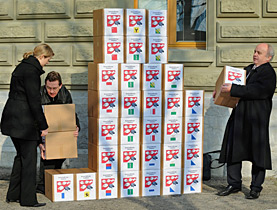Speaking the language of elderly migrants

Switzerland is not doing enough to care for its sizeable population of ageing migrants, an organisation promoting the rights of elderly foreigners said in Bern on Monday.
The “National Forum Ageing and Migration” said older migrants suffer from more health problems than the average Swiss pensioner, are often socially disadvantaged and live below the poverty line.
Foreigners account for one in five of Switzerland’s population, but according to the Federal Statistics Office, the country’s migrant workforce covers 25 per cent of the costs of the state-run pension scheme.
Yet, when members of this segment of the population retire they are confronted with a social security net that is not designed to meet their specific needs.
There was a more than fourfold rise in foreigners living in the country between 1950 and 1970 (from around 250,000 to 1.1 million), most of whom came from southern Europe (mainly Italians with a sizeable Spanish contingent).
These “guest workers” were largely employed in the construction industry and road works, building the infrastructure required to support Switzerland’s booming post-war economy.
The National Forum says about one-third of the members of this migration wave chose to make Switzerland their permanent residence and retire here, despite the expectation that they would eventually return home for good, replaced by other foreigners eager to have their jobs.
“Switzerland had no integration policy at the time so we really shouldn’t be surprised to see that they are worse off than the average Swiss senior often due to the manual labour they were required to perform,” Hildegard Hungerbühler of the National Forum told swissinfo.
Compensation
Hungerbühler said they must now receive compensation in the form of services tailored to their migration backgrounds.
The National Forum also released the results of a survey on what they need but rarely receive.
Elderly migrants require counselling in their mother tongue on a variety of subjects, including the social security and health care systems, advice on how to stay healthy and access to staff in hospitals and senior citizen homes who speak their language.
Old people suffering from dementia often forget the language they learned in Switzerland and therefore require qualified staff that understand them, which can even mitigate pain or suffering.
“It’s been shown that patients do not require as much medication if they can communicate in their native language,” Hungerbühler explained.
Anti-foreigner campaign
She added that many still suffer psychologically from a 1960s and 1970s anti-foreigner campaign that reached its peak in 1970 with a nationwide vote.
Around 45 per cent of the electorate supported an initiative to put a ten per cent cap on the number of foreigners living in the country, which, if accepted, would have meant the deportation of hundreds of thousands of migrant workers.
“Many still feel insulted today because they were asked to come to a country that wanted young, healthy workers, and they contributed to its economic development.”
“Without these migrant workers, we wouldn’t have been able to build the infrastructure we needed,” said Christine Egerszegi, National Forum president. “They also contributed greatly to our social security system.”
Egerszegi, a centre-right Radical party member of the Swiss senate, admitted to swissinfo that there were many political barriers to overcome before there was widespread support for elderly migrants.
“We have to raise awareness of the issue, especially in the conservative parts of the country, because there is a lot of anti-immigrant sentiment,” she said.
She added that some prominent members of the rightwing Swiss People’s Party, which has won votes with anti-foreigner campaigns, should be reminded of their own immigrant roots.
swissinfo, Dale Bechtel
Total Swiss population (2007): 7.59 million (21% foreigners)
Percentage of population 65 years of age and over: 16.4%
Approximately 10% of those 65 and over are non-Swiss.
Not taken account in statistics is number of naturalised Swiss pensioners.
The Forum was founded in 2003 by the largest organisations supporting migrants’ issues in Switzerland.
It works as a coordination platform and lobby group.
It also advises the Swiss government on how best to implement recommendations that came out of the 2002 United Nations conference on ageing.
In its report to the conference, Switzerland pledged to improve the lives of its elderly migrant population.

In compliance with the JTI standards
More: SWI swissinfo.ch certified by the Journalism Trust Initiative




You can find an overview of ongoing debates with our journalists here . Please join us!
If you want to start a conversation about a topic raised in this article or want to report factual errors, email us at english@swissinfo.ch.